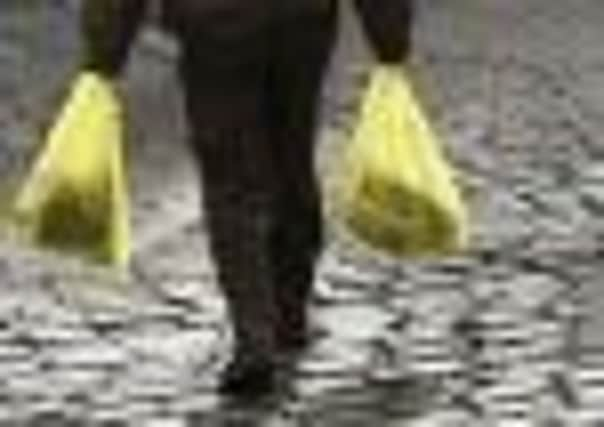5p bag tax set to raise £5m and cut waste


This week ministers will unveil their plans to force retailers to phase out free carrier bags in supermarkets and shops and instead charge for them in a bid to deter takers.
Cash raised by the levy on shoppers will be donated to charity and the government hopes that the initiative will raise up to £5 million for good causes each year.
Advertisement
Hide AdAdvertisement
Hide AdThe Scottish consultation will propose that there should be a requirement for all retailers to charge for all “thin gauge, disposable carrier bags, regardless of the material they are made from”. The charge would be set at a “minimum” of five pence.
The proposal will go ahead despite scepticism from retailers and business figures, who have expressed concern that such a levy could discourage firms from investing in Scotland and increase administrative costs for supermarkets and shops. The new tax is the key proposal contained in a government consultation paper “Safeguarding Scotland’s Resources” to be published on Wednesday.
The public will be given three months to respond to the tax proposal, which is based on the plastic bag scheme introduced in Wales at the end of last year.
Environment secretary Richard Lochhead said: “Carrier bags are a highly visible aspect of litter. By reducing the amount being carelessly discarded we can cut waste and its impact on our environment and economy. A small charge should also encourage us all to stop and think about what we discard and what can be re-used.”
He added: “This initiative will see retailers donating the proceeds to charitable good causes. It is hoped this could be up to £5m per year after retailers have covered their costs.”
It is hoped that the levy will cut the use of bags, the vast majority of which are plastic and do not degrade quickly, by 80 per cent. In Wales, the early indications are that carrier bag use has been cut by between 60 per cent and 80 per cent in supermarkets since a similar tax was introduced in October last year.
The proposal was welcomed by environmental groups, but business organisations had reservations about the move.
David Lonsdale, assistant director of CBI Scotland, said the tax could act as a “barrier” when it came to firms looking to invest in Scotland.
Advertisement
Hide AdAdvertisement
Hide Ad“You also have to consider that retailers are already making a lot of improvements to their environmental record. Something like this could add substantially to administration costs. We would also like to know if the government intends to increase the tax.”
Ian Shearer, director of the Scottish Retail Consortium, agreed that costs to businesses should be kept to a minimum.
“Retailers share the ambitions of the Scottish Government to reduce the use of carrier bags where possible – it’s something we’ve been working on for years with a great deal of success,” Shearer said.
“But despite their symbolic status, carrier bags are not the great environmental evil they’re often made out to be. Plastic bags account for a fraction of one per cent of household waste and today’s bags use 70 per cent less plastic than 20 years ago.
“An obsession with carrier bags mustn’t get in the way of the much more significant green goals retailers and households are working towards. We’re also concerned about any move which penalises shoppers at a time household budgets are under great strain.”
Shearer added: “If the government is determined to legislate on this then it’s essential the burden on retailers and customers is kept to a minimum. Following, and learning any lessons from, the approach already in place in Wales would at least be consistent.”
Green MSP Alison Johnstone welcomed the move, but added that Scotland was trailing behind Wales and Northern Ireland in reducing bag waste.
“The evidence from Wales is that a small charge is easy to implement and has a huge impact on shopper’s behaviour, which can only be a good thing for litter in our towns and for our wildlife, seas and beaches,” she said. “I ask those who oppose this policy to question whether there is such a thing as a free plastic bag. And who picks up the bill for littered cities and polluted seas?”